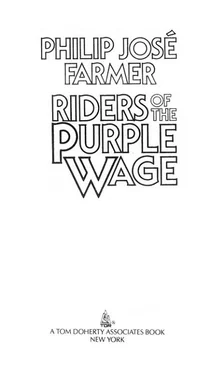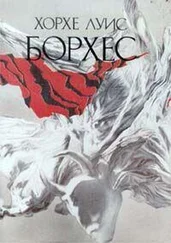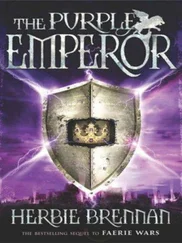Farmer Philip - Riders of the Purple Wage
Здесь есть возможность читать онлайн «Farmer Philip - Riders of the Purple Wage» весь текст электронной книги совершенно бесплатно (целиком полную версию без сокращений). В некоторых случаях можно слушать аудио, скачать через торрент в формате fb2 и присутствует краткое содержание. Год выпуска: 2014, Жанр: Социально-психологическая фантастика, на английском языке. Описание произведения, (предисловие) а так же отзывы посетителей доступны на портале библиотеки ЛибКат.
- Название:Riders of the Purple Wage
- Автор:
- Жанр:
- Год:2014
- ISBN:нет данных
- Рейтинг книги:5 / 5. Голосов: 1
-
Избранное:Добавить в избранное
- Отзывы:
-
Ваша оценка:
- 100
- 1
- 2
- 3
- 4
- 5
Riders of the Purple Wage: краткое содержание, описание и аннотация
Предлагаем к чтению аннотацию, описание, краткое содержание или предисловие (зависит от того, что написал сам автор книги «Riders of the Purple Wage»). Если вы не нашли необходимую информацию о книге — напишите в комментариях, мы постараемся отыскать её.
Gnatcatcher did not explain. He roared. “Get me the White House! And get another court order! We’re invading the house!”
“The White House, sir?” Smith said faintly.
“No, you imbecile! The house of Agrafan and Netter! Have our men armed, ready to shoot the first sign of resistance! Can you get hold of bazookas?”
Riders of the Purple Wage — читать онлайн бесплатно полную книгу (весь текст) целиком
Ниже представлен текст книги, разбитый по страницам. Система сохранения места последней прочитанной страницы, позволяет с удобством читать онлайн бесплатно книгу «Riders of the Purple Wage», без необходимости каждый раз заново искать на чём Вы остановились. Поставьте закладку, и сможете в любой момент перейти на страницу, на которой закончили чтение.
Интервал:
Закладка:
Netter, one of the two viewers who knew what was happening, said, “About ten seconds to go.”
“It’s terrible.” Agrafan said. “And there’s absolutely nothing we can do about it.”
Agrafan, the more emotional of the two, discharged a mist of formaldehyde particles, its equivalent of human tears.
The mechanical arm stopped. Its fingers only needed to close to delicately grip the object.
“They can’t be blamed,” Netter said. “How’re they to know?”
“That doesn’t help.” Agrafan said.
The fingers of the mechanical arm closed on the object. Only two of the three billion viewers were not surprised when the fingers and the object were briefly shrouded in blinding electricity. There was no explosive noise, of course.
The fragments of the object, impelled by the discharge, floated away. The fingers, half-melted, were frozen in their half-grip.
Startled and shocked, Rees cried out a four-letter word as pungent (socially speaking) as the product it referred to. Half of the citizens of the United States heard that, and less than half of that were offended. However, the network executives and millions of members of American religious organizations were outraged.
When the astronauts had recovered from their alarm, the captain explained what had happened. The epsilon ring was in a low-density plasma of relatively negatively charged electrons and positively charged ions. Since the electrons were less massive, they moved faster in the ring than the ions did. They collided more often with the rock debris in the ring. Thus, the pieces of debris built up, after a long time, a negative charge.
The astronauts had known this, but the Herschel, having been in the ring for thirteen months, had also collected a negative charge. Hence, they had not expected much of a discharge, if any.
The object they had tried to pick up must not have been in the ring long enough to pick up much of a negative charge. That had to be the only explanation possible. The object had been relatively positive to the arm, which, placed on the outside of the hull, had become positively charged.
The astronauts had assumed that the object had been in the plasma of the ring as long as the other space debris. Obviously, it had not. Where, then, had it come from? And when? And why were there so many similar objects that, for some unknown reason, looked as if they had been shaped by sentients?
Neither the astronauts nor the scientists on Earth were ever to advance the theory that the objects were living.
The only two on Earth who could have enlightened the theorizers were too shaken with grief at that moment to pass on their knowledge even if they had wanted to. They were flying—rocketing was a better description—around their huge room deep under a house. They were out of control, bouncing into the frozen carbon dioxide walls and ceiling and floors. Added to their grief were slight injuries from the impacts as their fierce discharges of formaldehyde droplets shot them here and there.
These expressions were matched by anchorman Rees’s uncontrollable tears and howlings. Rees was giving vent in his human way to the news that he had just been fired. Moreover, the entire industry would blackball him.
Jeremiah Gnatcatcher, a district director of the Internal Revenue Service, sat behind his desk in the Detroit skyscraper and scowled. The three field agents standing before his desk looked away from his eyes, as cold and as blue-green as Uranus in their human way and shields for a soul as black as Uranus’s rings. No one spoke for a long time; if Gnatcatcher had not been grinding his teeth, there would have been complete silence. It sounded to the agents like a shovel digging their graves.
At last, harshly, Gnatcatcher said, “What do you mean. Mr. Agrafan and Mr. Netter can’t come here? Since when can any taxpayer refuse to come here?”
Smith, the boldest of the agents, said, “Well, chief, it’s this way. Agrafan and Netter have notarized statements by three doctors that health reasons confine them to their house. So, like it or not, we have to go to them. Only…”
“Only what?” Gnatcatcher growled.
“Only…we can’t go to them for the same reason they can’t come to us. The doctors say that the allergies and poor immunity-protection systems of the two require them to live practically in quarantine. They’re like those babies that live in isolation bubbles.”
The three agents could not interpret their boss’s peculiar expression. That was because he had not used that particular interplay of facial muscles since becoming district director. It portrayed frustration.
“Okay, okay. So we can’t, for the time being, anyway, get them in here to sweat them or go to them for brow-beating. What about their lawyers? They don’t have any excuse not to come here to represent their clients.”
“The firm of Reynard, Wolfgang, Mustela, and Scarab has been very cooperative,” Brown, the second agent, said. “After we got a court order to seize their tapes.”
“I know that,” Gnatcatcher said impatiently. “You dummies never catch on that all my questions are rhetorical.”
“Sorry, boss,” Smith, Brown, and Jones said in unison.
“So what have our auditors found?”
The three were silent. Finally, Gnatcatcher barked, “What’s the matter? You don’t know! ”
“We thought the question was rhetorical,” Smith said.
“I’ll tell you when they’re rhetorical. So, what have they dug up?”
“A can of worms,” Smith said. “The tape records look okay on the surface, and they are. I mean, they’re not doctored. But still waters run deep. Some of the tapes, most of them, in fact, have codes, references to other companies and record tapes. We had to get a second court order to force the lawyers to explain their meaning.”
Smith stopped talking and licked his lips. His eyes were glazed.
“Well?” Gnatcatcher said.
“We uncovered a pyramid of real corporations and dummy corporations, a maze of interlocking financial structures that was so complex that even the computer had to shut down and cool off for a while. Our auditors got dizzy; one of them went to bed with chronic vertigo. But we`ve uncovered what looks to me like a conspiracy to end all conspiracies, a super-super-conglomerate. The Justice Department is going to have a ball with antitrust suits. If we tell them about this. Personally, I think we should. Anyway, those two hypochondriacs, Agrafan and Netter, if they are only hypochondriacs and not something sinister, make Howard Hughes look like an inept extrovert. They’re at the apex of the pyramid and the end of the maze. They own…”
Smith licked his lips again. Gnatcatcher said, “Well?”
“Interlocking global conglomerates and several Third World nations worth…ah…worth…”
“Spill it, man! Get it out!”
Smith’s voice squeaked.
“Three trillion dollars!”
“That Walt Whitman knew what the universe was all about,” Agrafan said. “Listen.
I celebrate myself and sing myself.
And what I assume you shall assume.
For every atom belonging to me as good as belongs to you.
How about that? An ignorant Earth-person sees intuitively that all is connected. The atoms of Earth’s flesh ring from the impact of a meteor falling into Uranus. A temple bell tolls in India, and an entity on Arcturus IV wonders where that vagrant but novel and illuminating thought comes from. Wonderful! Yet, he was an oxygen breather!”
“It’s not that simple.” Netter said.
They were in the subterranean room beneath the mansion which the local natives had built long ago for them without understanding why or for whom. The locals had been satisfied with the pay, and, if they were curious about it, they had not pursued their nosiness. Nor had the house servants ever tried to find out why their employers never revealed themselves but always gave orders through the telephone. They had been happy with the extremely high pay, though those hired in the beginning had not known that the money was counterfeit. Later, the two agents of UFO, the Uranian Field Operation, had made real money from their investments with the fake.
Читать дальшеИнтервал:
Закладка:
Похожие книги на «Riders of the Purple Wage»
Представляем Вашему вниманию похожие книги на «Riders of the Purple Wage» списком для выбора. Мы отобрали схожую по названию и смыслу литературу в надежде предоставить читателям больше вариантов отыскать новые, интересные, ещё непрочитанные произведения.
Обсуждение, отзывы о книге «Riders of the Purple Wage» и просто собственные мнения читателей. Оставьте ваши комментарии, напишите, что Вы думаете о произведении, его смысле или главных героях. Укажите что конкретно понравилось, а что нет, и почему Вы так считаете.









![О Генри - Пурпурное платье [The Purple Dress]](/books/405339/o-genri-purpurnoe-plate-the-purple-dress-thumb.webp)

